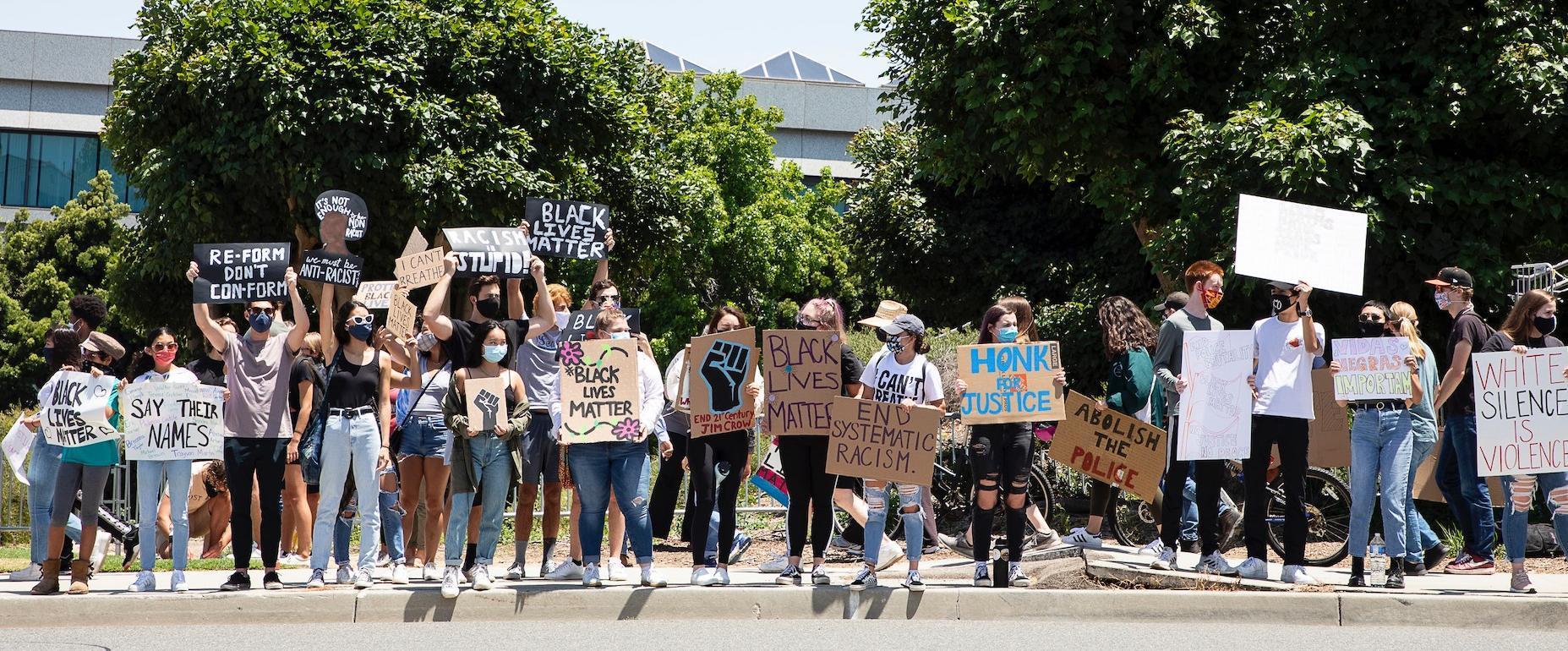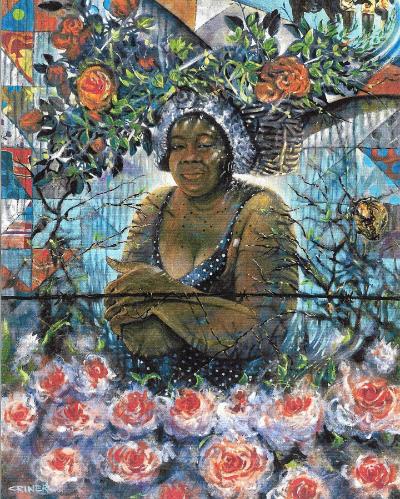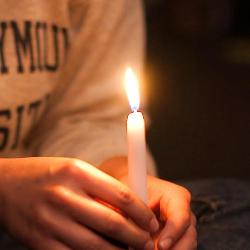
Friday, June 19: Observing Juneteenth
June 19, known as Juneteenth, commemorates the end of slavery in the United States. It is a day to listen, learn, and act: to reflect on the lasting impacts of slavery, to confront and oppose systemic racism and violence, and to honor Black lives. In addition to the reflections and resources included here, Intercultural Affairs' Anti-Racism and Inclusion Resources page and the William H. Hannon Library’s staff-curated Black Lives Matter resource guide offer more inspiration and support in working for justice and dismantling systemic racism.
A Reflection on Our Present Moment
John Sebastian, Ph.D.
Vice President for Mission and Ministry
June 2, 2020
Then I saw a new heaven and a new earth. The former heaven and the former earth had passed away, and the sea was no more. I also saw the holy city, a new Jerusalem, coming down out of heaven from God. … I heard a loud voice from the throne saying, ‘Behold, God’s dwelling is with the human race. He will dwell with them and they will be his people and God will always be with them as their God.’ God will wipe every tear from their eyes, and there shall be no more death or mourning, wailing or pain, for the old order has passed away.
- Revelation 21:1-4
Apocalypse. From the Greek apo- ("un-") and kaluptein ("to cover"). A sudden disclosure.
Apocalypse. The final book of the Christian Scriptures, more familiarly known to English readers of the Bible as Revelation, from the Latin re- ("un-") and velare ("to cover"). A lifting of the veil.
Apocalypse. According to the Oxford English Dictionary: "a disaster resulting in drastic, irreversible damage to human society or the environment, esp. on a global scale; a cataclysm." A turning point.
Apocalypse. The year 2020, during which we humans discovered that our mastery of nature is a lie, that for all of our technological advances, we can still be brought to our knees or worse by a subcellular agent of infiltration hiding inside of us — only to then learn, almost simultaneously, that our American mythology, founded on tall tales of equality for all and manifest destiny and exceptionalism secured by God’s blessing, is also a lie and no match for the persistent and pernicious stain of racism that preceded all those subsequent stories and that is the primordial muck out from which this nation crept forth.
Apocalypse. A sudden disclosure. A lifting of the veil. A turning point.
But not really, for none of what we have been living through these last few days and weeks, however apocalyptic it seems, should come as a surprise. The devastation of the coronavirus and the national outrage occasioned by the murders — the modern-day lynchings — of Breonna Taylor, Ahmaud Arbery, George Floyd, and the countless Breonnas and Ahmauds and Georges who preceded them in ignominious death, should come as no surprise. What was under cover and behind the veil has been there all along. Some of us simply weren’t looking, and some of us have never had the luxury of looking away. The loss of human life to COVID-19 has been the effect of biology, yes, but equally or even more so the result of deliberate social engineering and immoral politicking, of conscious efforts to keep vast swaths of society in perpetual states of need and dependence and bondage for the benefit of a select few, of the same sinful policies that enabled the growth of modern-day police forces from colonial slave patrols.
No, the real apocalypse, the real disclosure, the real turning point still lies ahead of us. It will come when those of us who have willfully turned our gaze elsewhere pull back the veil and see with clear vision the rot deep in the core of our humanity and repentantly beg for God’s healing grace.
Much has been said about the uneven impact of the coronavirus on marginal and vulnerable populations or about what might be an "appropriate" response to the chaos that has claimed our cities. I will forego further pontificating and instead challenge the privileged among us to take action, to look to our own hearts and see where we need God’s—and humanity's—forgiveness, to name the times when we have been agents of oppression rather than liberation. For my part, I will try to stand humbly before Jesus, lynched by the state and nailed to the cross, and ask:
What have I done to heal the wounds of racism, what am I doing to heal the wounds of racism, what ought I to do to heal the wounds of racism?
May God bless us all and draw us closer in love to Godself and to one another, so that together we might soften the wailing and lessen the pain of all who suffer.
John T. Sebastian, Ph.D., is LMU's Vice President for Mission and Ministry and a professor of English.
✜
A Litany for Those Not Ready for Healing
Yolanda Pierce, Ph.D.
Let us not rush to the language of healing, before understanding the fullness of the injury and the depth of the wound.
Let us not rush to offer a band-aid, when the gaping wound requires surgery and complete reconstruction.
Let us not offer false equivalencies, thereby diminishing the particular pain being felt in a particular circumstance in a particular historical moment.

Let us not speak of reconciliation without speaking of reparations and restoration, or how we can repair the breach and how we can restore the loss.
Let us not rush past the loss of this mother’s child, this father’s child…someone’s beloved son.
Let us not value property over people; let us not protect material objects while human lives hang in the balance.
Let us not value a false peace over a righteous justice.
Let us not be afraid to sit with the ugliness, the messiness, and the pain that is life in community together.
Let us not offer clichés to the grieving, those whose hearts are being torn asunder.
Instead…
Let us mourn black and brown men and women, those killed extrajudicially every 28 hours.
Let us lament the loss of a teenager, dead at the hands of a police officer who described him as a demon.
Let us weep at a criminal justice system, which is neither blind nor just.
Let us call for the mourning men and the wailing women, those willing to rend their garments of privilege and ease, and sit in the ashes of this nation’s original sin.
Let us be silent when we don’t know what to say.
Let us be humble and listen to the pain, rage, and grief pouring from the lips of our neighbors and friends.
Let us decrease, so that our brothers and sisters who live on the underside of history may increase.
Let us pray with our eyes open and our feet firmly planted on the ground
Let us listen to the shattering glass and let us smell the purifying fires, for it is the language of the unheard.
God, in your mercy…
Show me my own complicity in injustice.
Convict me for my indifference.
Forgive me when I have remained silent.
Equip me with a zeal for righteousness.
Never let me grow accustomed or acclimated to unrighteousness.
Yolanda Pierce, Ph.D. is the Dean of the Howard University School of Divinity and a Professor of African American Religion & Literature.
Reflect and Act
- "The Assumptions of White Privilege and What To Do About It," Fr. Bryan Massingale (National Catholic Reporter)
- #BlackCatholics Syllabus, Dr. Tia Noelle Pratt
- "How can Catholics help lead the fight against racism?", Olga Segura (America Magazine)
- Ignatian Prayer Vigil for Lamentation and Racial Justice, June 25, 2020 (Ignatian Solidarity Network)
- Commitment to Witness & Respond for Racial Justice (LMU Campus Ministry)
More Resources
- Office of Intercultural Affairs' Anti-Racism and Inclusion Resources
- William H. Hannon Library Black Lives Matter resource guide
- Office of Mission and Ministry's Resources for Racial Justice and Anti-Racism

